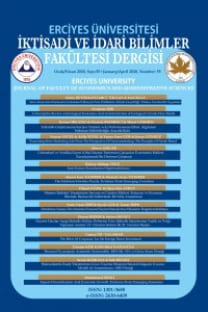FİNANSAL TABLO MANİPÜLASYONLARININ TESPİTİNDE YAPAY SİNİR AĞLARININ KULLANILMASI
DETECTION OF FINANCIAL STATEMENT MANIPULATIONS THROUGH ARTIFICIAL NEURAL NETWORKS
___
- Aksoy, B. (2021). Finansal tablo hilelerinin makine öğrenmesi yöntemleri ve lojistik regresyon kullanılarak tahmin edilmesi: borsa İstanbul örneği. Maliye ve Finans Yazıları, (115), 27-58.
- Altman (1968). Financial Ratios, Discriminant Analysis and the Prediction of Corporate Bankruptcy. The Journal of Finance, (23)4, 589–609.
- Aşkın, D., İskender, İ., Mamızadeh, A. (2013). Farklı yapay sinir ağları yöntemlerini kullanarak kuru tip transformatör sargısının termal analizi. Gazi Üniversitesi Mühendislik Mimarlık Fakültesi Dergisi, 26 (4).
- Bekçi, İ. ve Avşarlıgil, N. (2011). Finansal bilgi manipülasyonu yöntemlerinden yaratıcı muhasebe ve bir uygulama. Muhasebe Bilim Dünyası Dergisi, 2011/2, 131-161.
- Beneish, M.D. (1999). The Detection of Earnings Manipulation. Financial Analysis Journal, 55(5), 24-36.
- Bloomberg Professional Service. (2021, Eylül 4). Borsa İstanbul şirketlerinin finansal ve mali tablolarına ait veriler. Erişim Adresi https://www.bloomberg.com/professional/solution/content-and-data/
- Cohen, J. (1960). A coefficient of agreement for nominal scales. Educational and Psychological Measurement, 20, 37–46.
- Erdoğan, M. ve Erdoğan, E.O. (2020). Financial Statement Manipulation: A Beneish Model Application", Grima, S., Boztepe, E. and Baldacchino, P.J. (Eds.) Contemporary Issues in Audit Management and Forensic Accounting (Contemporary Studies in Economic and Financial Analysis, Vol. 102), Emerald Publishing Limited, Bingley, s. 173-188.
- Fanning K, Cogger K.O. ve Srivastava R.(1995). Detection of management fraud: a neural network approach”, intelligent systems in accounting, Finance and Management, 4(2), 113-126.
- Fındık, H. ve Öztürk, E. (2016). Finansal bilgi manipülasyonunun Beneish modeli yardımıyla ölçülmesi: Bist imalat sanayi üzerine bir araştırma. İşletme Araştırmaları Dergisi, 8(1), 483 - 499.
- Güner, M. ve Kurnaz, E. (2020). Muhasebe manipülasyonunun Beneish modeli yardımıyla ölçülmesi: Bist kimya, petrol, plastik endeksi şirketleri üzerine bir araştırma. Muhasebe ve Vergi Uygulamaları Dergisi, 13(2), 195-214.
- Gürol B. (2021). Pandemi sürecinde finansal bilgi manipülasyonun ölçülmesi: borsa istanbul imalat sektörü işletmeleri üzerine bir araştırma. Yüksel Akay (Eds.). Bankacılık ve Finans Çalışmaları. Livre de Lyon.
- Kamuyu Aydınlatma Platformu (KAP).(2021, Eylül 4). Bist şirketleri. Erişim Adresi https://www.kap.org.tr/tr/bist-sirketler
- Beneish modeli ile kazanç manipülasyonunun tespit edilmesi: bist şirketleri üzerine ampirik bir uygulama. Uluslararası Alanya İşletme Fakültesi Dergisi. 8. 13-25.
- Kara, S., Sakarya, Ş. Ve Aksu, M. (2016). Beneish modeli ile kazanç manipülasyonunun tespit edilmesi: Bist şirketleri üzerine ampirik bir uygulama. Uluslararası Alanya İşletme Fakültesi Dergisi, 8, 13-25.
- Kutlu B.ve Badur B. (2009). Yapay sinir ağları ile borsa endeksi tahmini. Yönetim Dergisi:İstanbul Üniversitesi İşletme Fakültesi İşletme İktisadı Enstitüsü, 20(63), 25 - 40.
- Küçükkocaoğlu, G., Benli Y.K. ve Küçüksözen, C. (2007). Finansal bilgi manipülasyonunun tespitinde yapay sinir ağı modelinin kullanımı. İMKB Dergisi, 36, 1-30.
- Küçükkocaoğlu, G. ve Küçüksözen, C. (2005). Gerçeğe aykırı finansal tabloların ortaya çıkarılması: imkb şirketleri üzerine amprik bir çalışma. Muhasebe ve Finansman Dergisi, (28), 160-171.
- Küçüksözen, C. (2004). Finansal bilgi manipülasyonu nedenleri yöntemleri amaçları teknikleri sonuçları ve İMKB şirketleri üzerinde ampirik bir çalışma. (Doktora Tezi). Ankara Üniversitesi Sosyal Bilimler Enstitüsü, Ankara
- Landis, J. R. ve Koch, G. G. (1977). The measurement of observer agreement for categorical data, Biometrics, 33, 159-174.
- Maccarthy, John. (2017). Using Altman z-score and Beneish m-score models to detect financial fraud and corporate failure: a case study of enron corporation. 10.5923/j.ijfa.20170606.01.
- Tepeli, Y. ve Kayıhan, B. (2016). Muhasebe manipülasyonunun Beneish modeli ile tespit edilmesi: Bist gıda maddeler sanayi sektörü’nde bir uygulama.
- Toplu, N, Calayoğlu, İ, ve Azaltun, M.(2021). Finansal bilgi manipülasyonu ortaya çıkarmaya yönelik bir araştırma (Beneish model). Muhasebe ve Finans İncelemeleri Dergisi, 4(1), 16 – 25.
- Yavuz, S. ve Deveci, M. (2012). İstatiksel normalizasyon tekniklerinin yapay sinir ağın performansına etkisi. Erciyes Üniversitesi İktisadi ve İdari Bilimler Fakültesi Dergisi. 40, 167-187.
- ISSN: 1301-3688
- Yayın Aralığı: 3
- Başlangıç: 1981
- Yayıncı: -
Mehmet Serdar ATAY, Neriman POLAT ÇELTİKCİ
DIŞ BORÇLANMA, İKTİSADİ BÜYÜME, CARİ AÇIK VE FİNANSAL GELİŞME İLİŞKİSİ: TÜRKİYE ÖRNEĞİ
Hamza ÇEŞTEPE, Arzu TAY BAYRAMOĞLU, Enes SÜMER
JEOPOLİTİK RİSK ENDEKSİNİN DURAĞANLIK SINAMASI: KIRILMALI FOURİER PANEL BİRİM KÖK TESTİ
Umut Turgut YILDIRIM, Gökhan KONAT, Zekeriyya AKDAĞ
EKONOMİK NABZI TUTMAK: TÜRKİYE’DEKİ MAKROEKONOMİK ZAMAN SERİLERİ İLE GELİŞTİRİLMİŞ BİR KRİZ ENDEKSİ
ÇELİK SEKTÖRÜNDE REKABET GÜCÜNÜN KARŞILAŞTIRMALI ANALİZİ: ÇELİK ÜRETEN İLK 10 ÜLKE ÖRNEĞİ
SİMİO İLE ÇALIŞMA STRATEJİLERİNİN MÜŞTERİ MEMNUNİYETİ ÜZERİNDEKİ ETKİSİNİN BENZETİMİ: BANKA ÖRNEĞİ
